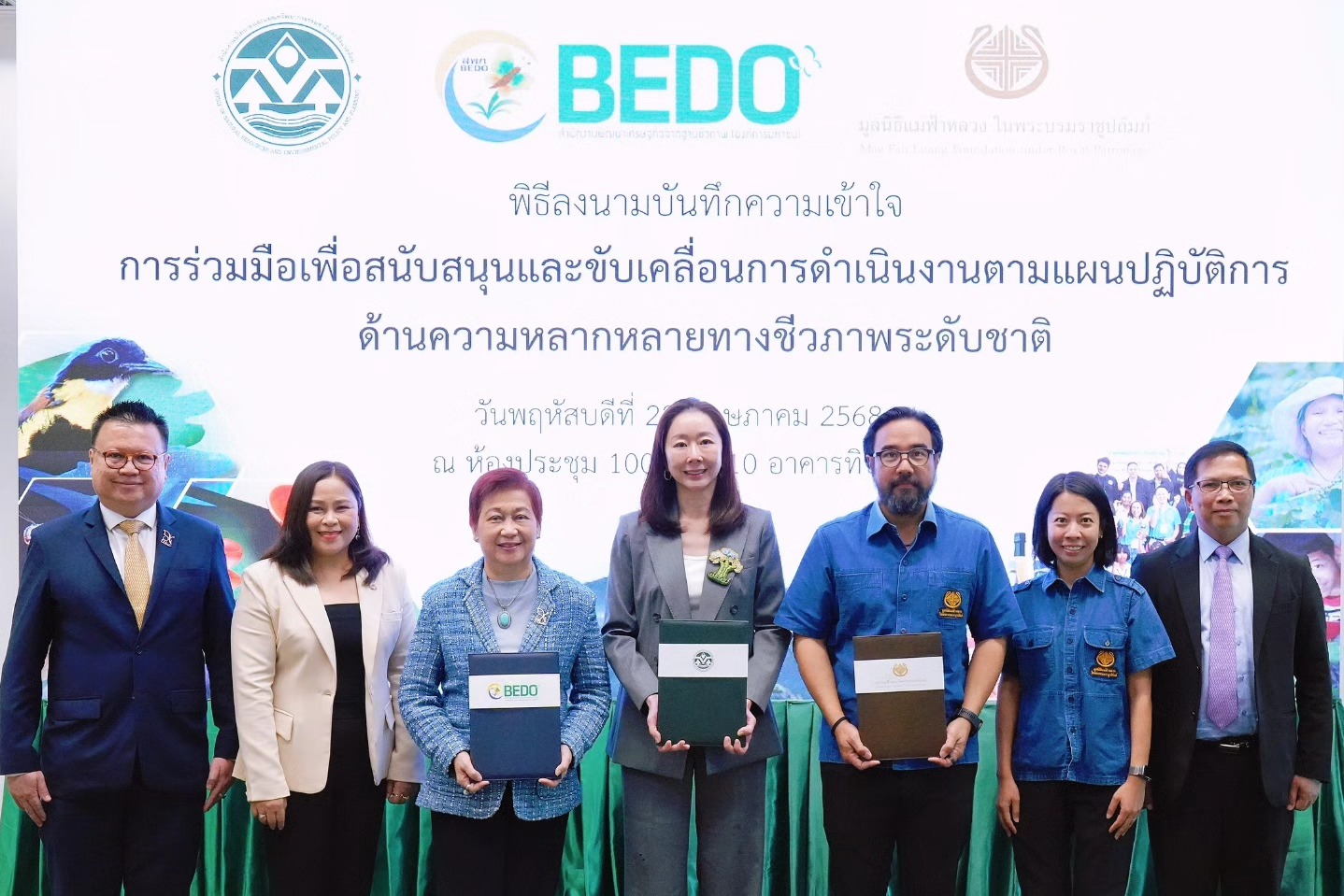Amid growing global environmental challenges that have brought biodiversity to the forefront of international policy, the Mae Fah Luang Foundation under Royal Patronage, recognized for its longstanding leadership in natural resource restoration and sustainable development, has been invited by the Office of Natural Resources and Environmental Policy and Planning (ONEP) and the Biodiversity-Based Economy Development Office (BEDO) to serve as an Implementation Partner under a newly signed Memorandum of Understanding (MOU).
This collaboration aims to support the effective implementation of Thailand’s National Biodiversity Strategy and Action Plan (NBSAP) at the local level. The MOU signing ceremony was held recently at ONEP headquarters, with the agreement formally signed by M.L. Dispanadda Diskul, Secretary-General and Chief Executive Officer of the Mae Fah Luang Foundation; Dr. Chayanan Pakdeejit, Secretary-General of ONEP; and Ms. Suwanna Tiansuwan, Director General of BEDO. This strategic partnership focuses on bridging policy with on-the-ground action in order to achieve the targets set out in the NBSAP (2023–2027), Thailand’s fifth national plan on biodiversity. Key areas of cooperation include the development of biodiversity-related financial mechanisms, data integration, expansion of protected areas, knowledge exchange in bioeconomy and product development, community-based implementation, and youth engagement. The MOU outlines a three-year collaboration framework among the three organizations.
The event also featured presentations by youth participants from BEDO’s Community BioBank and Biogang projects, as well as the Biodiversity Camp organized by the Mae Fah Luang Foundation—highlighting the vital role of young people in biodiversity conservation and their commitment to participating in this national initiative.
M.L. Dispanadda Diskul emphasized that the Foundation’s work is deeply rooted in the development philosophy of Her Royal Highness Princess Srinagarindra, affectionately known as “Somdej Ya”, who championed the principle of “people living in harmony with forests, and forests sustaining the lives of people.” For nearly four decades, the Foundation’s Doi Tung Development Project has embodied this principle through its “Reforest People, Rebuild Forests” approach, which integrates environmental, economic, and social development in a sustainable model. The Foundation continues to monitor and study biodiversity in the area to ensure that its approach yields measurable, positive outcomes for local ecosystems.
With extensive experience in implementing community development in real-world settings—ranging from Doi Tung and replication sites nationwide and abroad, to initiatives like community forest carbon credit management and social enterprises under the DoiTung brand—the Foundation also incorporates nature-related risk assessments to improve resource management, rehabilitate degraded ecosystems, and deliver sustainable economic returns to communities.
The Mae Fah Luang Foundation is honored to contribute its participatory natural resource management expertise, field-tested knowledge, and continuously documented ecological data to support the national implementation of the NBSAP. This commitment aligns with the Kunming–Montreal Global Biodiversity Framework and Thailand’s 30×30 target, which aims to conserve 30% of the country’s land and marine areas by 2030.
As an Implementation Partner, the Foundation firmly believes that meaningful biodiversity conservation must be grounded in real action at the community level, with local stakeholders as custodians of their natural resources. Through collaboration, capacity building, and shared responsibility, the Foundation remains dedicated to helping Thailand achieve its biodiversity goals in a sustainable and inclusive manner.
